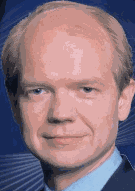



In April 1999, embarrassment was caused when Conservative MEP's voted for steps towards a 'European legal area' with the 'Corpus Juris' penal code. The latter would threaten to replace the British traditions of public trial by jury and Habeas Corpus with a European Public Prosecutor with swingeing powers of arrest and detention; based on suspicion rather than evidence.
Further embarrassment resulted after the EPPG welcomed the appointment of Romano Prodi as European Commission President (website 24 March 1999). In May, Prodi stated that he ran the 'Government of Europe' and went on to call for a European army.
Although not corporately bound by the EPPG's policies, Conservative MEPs took steps to distance themselves from the openly federalist EPP. They instead affiliated to a group 'European Democratic Union' (EDU), which then linked up to their EPP colleagues in a new grouping - 'Group of European People's Party and European Democrats in the European Parliament' (EPP-ED)
When is a Relationship not a Relationship?
This was made clear on the 'Conservatives in the European Parliament' web-page, which even added:
"The Conservative Party, like the Gaullist RPR and Forza Italia, has no relationship with the EPP transnational party. It is a member of the EDU, a parallel centre-right confederation, which includes some but not all EPP national parties".
There is some element of the right hand not knowing what the left hand is doing, for in December the EPP website announced:
"UNION OF CENTRIST PARTIES A STEP CLOSER
At the EPP summit, the day before [the Helsinki Summit, 18 Dec], President Wilfried Martens helped cut another, if smaller Gordian knot - how to bring closer together the EPP and the EDU.
Their members have largely overlapped since they were founded in the mid 1970s. The essential difference is - or has been - the EPP's central commitment to European integration and the EDU's more intergovernmental approach....
...Bringing together the EPP with the Vienna-based EDU has been a longstanding ambition among leaders of centrist parties in Europe. Their member parties largely overlap, and they share the same basic ideas and values"
Shared Ideas and Values?
The EPP website states "We above all share a common commitment to a... united federal Europe". It also declares
a single European currency "a necessity".
The EDU website claims that "Freedom not collectivism is the watchword of the EDU". However some of its members when in Government, such as the Conservatives under John Major and Helmut Kohl's CDU, pushed through the Maastricht Treaty which committed to: "organise in a manner demonstrating consistency and solidarity, relations between the Member States and between their peoples".
'Maastricht' reduced national vetoes and put several 'inter-governmental' areas of policy under EU control. Indeed, at Madrid in 1992, the party leaders in the EDU collectively backed this.
On BBC TV Question Time, 1 July 1999, William Hague described 'Maastricht' as "one of John Major's achievements", and said that he wouldn't undo any of its provisions!
Some may also see significance in the fact that the Conservative Party speaks of "centre-right" allies, but the EDU and EPP talk of a "centre" grouping.
Developments
The EPP website noted "unanimous" backing for EPP President Wilfried Martens' proposal: to close the EDU's office in Vienna, and to move its Executive Secretary to the EPP offices in Brussels - with effect from March. That a single subscription is proposed indicates that this is more than closer co-operation.
There seems to have been no disclaimer of any sort from the Conservative Party on the possible merger between the EPP and EDU, and the slight matter of "no relationship".
Incidentally, the Conservative website was also technically inaccurate as Forza Italia joined the EPP in late 1999!
The EPP website ("News" section, seen 26 Feb) lists the Conservative Party and Forza Italia under 'EPP Group and EPP/EUCD member parties' with a graphic of their electoral support. As the listing included EPP parties from countries outside the EU (e.g. Switzerland, Malta), it is not conceivable they were referring to the former EPPG grouping.
The "Party" section lists former Tory Chairman Chris Patten as one of the European Commissioners "either belonging to EPP member parties or working closely with it". If there is "no relationship", someone had better advise the EPP so they can update their records!
Meanwhile, outgoing shadow Foreign Secretary, John Maples, this month (February) offered to give up Britain's veto over deeper integration in exchange for the flexibility to opt out of new non-core EU legislation. The only problem is that under established procedure ('acquis communautaire') all EU legislation is effectively 'core' - making allowances for specially negotiated opt-out arrangements.
And in Brussels, the Conservatives' "ally", Mrs Diemut Theato (EPP) has urged that the institution of a European Public Prosecutor for offences against the EU be placed on the agenda for Treaty revisions at this year's Inter-Governmental Conference.
The Conservative Party claims to be against the concepts of 'Corpus Juris' and 'European legal area'. It is ironic that the House of Lords could have delayed or even defeated the Amsterdam Treaty that now makes them a possibility. However, according to Christopher Booker (S. Telegraph, 24.5.1998), the Conservative whips allowed and even encouraged their Peers to go home in spite of the crucial vote looming.
The inconsistencies of "In Europe but not ruled by it" may soon come to haunt William Hague.
References*:
Web-sites visited between 3 Feb and 9 Feb 2000.
www.conservative-party.org.uk - Conservative Party
www.eppe.org - EPP (the party)
members.magnet.at/edu/members.htm - EDU (NB no 'www')